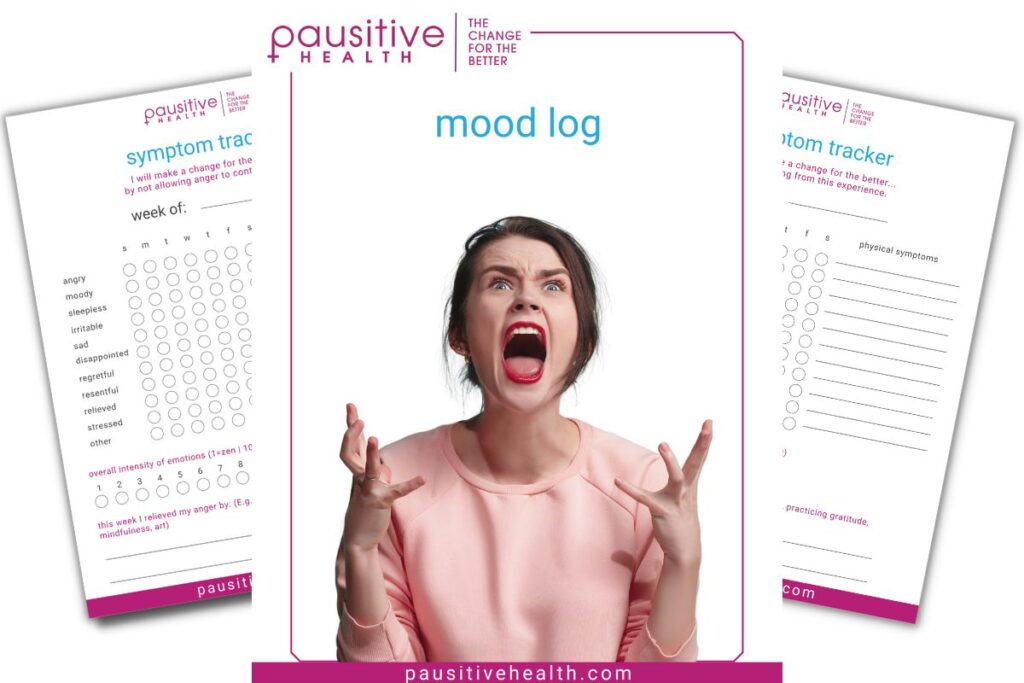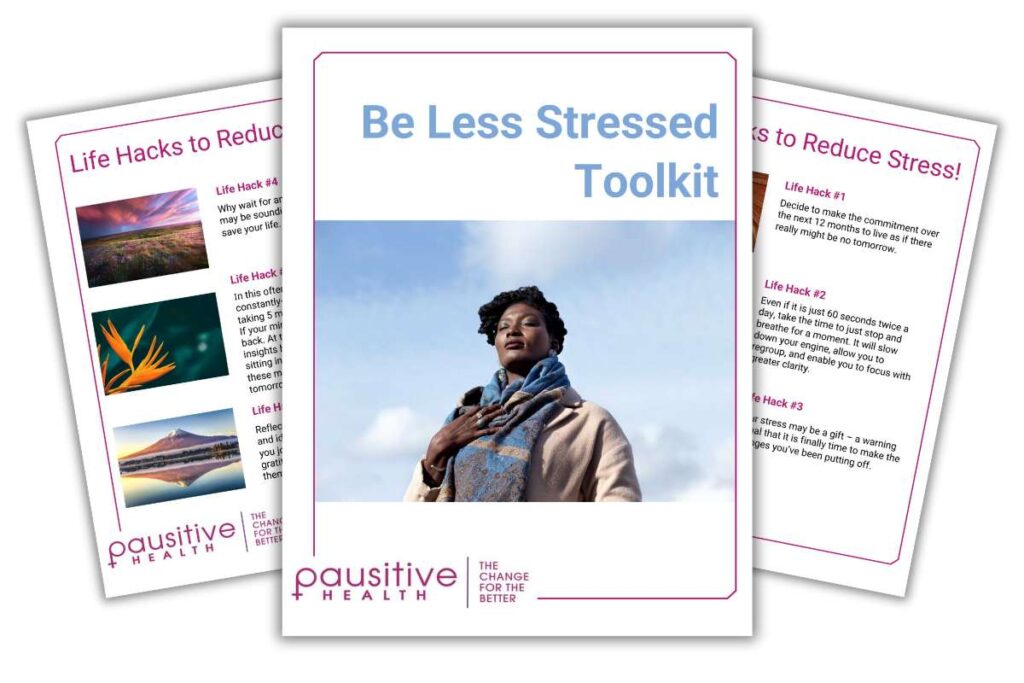During menopause, you may think of anger as just another symptom. Or it may be one of those symptoms that gives you pause because it’s so powerful and can feel uncontrollable. Anger can affect relationships and evolve to rage. Anger problems are bad for your health, too, contributing to issues like depression.
What anger does to your body
When you get angry, how do you feel? Can you anticipate the rage as it burns in your body and manifests as an outburst? When you get angry, does your heart race? Your muscles tighten, fists and teeth clench, head throb, nostrils flare, and gaze becomes fixed?
If this all sounds like it would not be good for you, you’re right. There’s a profound impact on your health, and this emotion can also lead to behaviors like self-medicating with alcohol, drugs, or stress eating that further complicate the picture.
You’re hypervigilant and have activated the fight-or-flight response. Your face may turn red, your blood pressure rises, your heart pounds, and your body can become physically animated with movements like throwing your arms up in the air.
And in addition to these reactions, the situation can be made worse by saying things you will regret later. Some women liken it to experiences they have had with premenstrual syndrome.
Then there’s the aftermath when things have calmed down. You may feel physically drained, have sore muscles, experience an interrupted thought process, lose concentration, or even cry.
Anger without focus and proper channeling is destructive! (When controlled and directed in an appropriate fashion, anger can actually be a motivator for positive change.)
What’s causing the anger?
Anger, like most emotions, is complicated.
First, there are hormonal changes that occur during the menopausal transition. Besides the overall drop in the level of hormones like estrogen and progesterone, there’s the volatility that occurs until things settle out in the postmenopause stage of the journey.
During the transition, the changes can also increase sensitivity to stress that might have been taken in stride in the past. (They can also lead to greater vulnerability to a depressed mood).
Hormones released by the adrenal glands (located on top of your kidneys) – adrenaline and cortisol – generate many physical effects of anger/rage.
Adrenaline increases blood pressure and heart rate, and cortisol can prolong your hypervigilant state.
To add to the mix are menopause symptoms like hot flashes, night sweats, and muscle aches and pains that can lead to sleepless nights or even insomnia. Sleep deprivation doesn’t typically lead to a sunny disposition or increase your patience!
Then there are the feelings that can be stirred up related to the changes some experience, like weight gain, new/different body odor, vaginal dryness, and a loss of interest in sex. And if you feel alone or not understood in your suffering or are subjected to medical gaslighting, frustration levels can run high.
For some, this time in life can also create a sense of a lack of control and uncertainty.
Putting it all together, your body goes to battle and pays the price. And in many cases, the price is at least as high (maybe higher) for you as the object of your fury.
How anger affects your health
Anger is one of those menopause symptoms you shouldn’t ignore, because it’s unlikely to fade away on its own.
What are the consequences of frequent or ever-simmering anger and resentment? Falling into a pattern of chronic emotional distress related to anger can result in multiple negative impacts to your physical health which include (but are not limited to):
- elevated blood pressure and blood glucose
- increased inflammation in your body
- higher risk of heart disease
- higher risk of stroke
- weakened immune system
- higher risk of respiratory/lung problems
- shorter life span
- increased risk or exacerbation of depression and anxiety
Anger is an acid that can do more harm to the vessel in which it is stored than to anything on which it is poured.
~ Mark Twain
Here’s an animated educational video showing you how anger affects your health.
Anger can also lead to depression, a condition for which menopausal women are already at increased risk, or an exacerbation if it is a preexisting issue.

Anger and depression
Anger is a secondary emotion, so something, or a combination of things, is likely fueling it. You need to identify those causes, as those deep-seated feelings can also affect your emotional state.
You want to avoid a downward spiral with anger, especially during menopause, when you may often already feel like you’re on an emotional rollercoaster.
Depression can manifest in different ways but typically presents as sadness, lack of interest in activities you once enjoyed, sleeplessness or sleeping too much, loss of appetite, and reduced physical activity levels.
During the menopause transition, estrogen levels drop far more than testosterone (levels in women normally begin to decline in their 20s). It is unclear what, if any, impact this change in the relative levels between the two hormones may have. However, for some people, the symptoms of depression are irritability, anger, and rage. Interestingly, this picture of anger is often the one that most commonly shows up in men.
Given the potential long-term repercussions of chronic anger, now would be a good time to reflect on the role anger plays in your life.
What can you do about your anger?
A great first step is to figure out what causes anger in your life. What are your triggers?

Get Relief From Your Emotions
Having mood swings? Track how you feel, identify your triggers, and find ways to calm the emotional firestorm with this mood log.
"*" indicates required fields
The pandemic years have been difficult across the globe, and emotional distress is at an all-time high. Uncertainty often looms large and can bring fear and stress, triggering episodes of anger when the loss of “normal” becomes overwhelming.
Is it due to a chronic condition or longstanding stress, the loss of a loved one or a job, relationship conflicts, an out-of-control workload, or what can be the everyday unfairness of life?
Or, is it related to the hormonal changes and symptoms of the menopause journey?
All of the above?
Channeling your anger
Next, there are the basics that consistently have been shown to contribute to better physical and emotional health:
Physical activity
Move the anger and rage out of your body! And if you can do it outside in nature, even better.
Sleep
Pay attention to sleep hygiene and connect with your provider to determine if hormone therapy (HT) or non-hormonal options may help you get enough good quality sleep.
Healthy eating
Studies now suggest a connection between our gut microbiome, the brain, and our emotions, including depression.
The Mediterranean diet has been found to be a good choice for an eating approach that helps optimize health and manage weight. You can also choose foods that can help menopause symptoms, like improving gut health, which is negatively impacted by anger.
Stress management
Identify coping skills to help keep stress under control and spend more time feeling grounded and balanced.
Community
Everyone struggles at some point in life. Reach out to friends and family to let them know you need their support and understanding. This is not the time for a stiff upper lip. You are not alone. There is a path forward, even in the most uncertain times.

Be Less Stressed
Feeling stressed or overwhelmed? Learn life hacks to reduce stress with the Be Less Stressed toolkit.
"*" indicates required fields
Then learn how to channel your anger.
Finally, it’s also important to recognize that anger doesn’t have to be all bad. It can be a positive emotion. You can actually come out of a difficult situation a stronger person.
The goal then, isn’t to eliminate anger entirely. Instead, it’s to realize its impact, recognize when anger is disrupting your life, and take steps to focus it in ways that will be to your benefit instead of harm.
Call 9-8-8
Saglam HY, Basar F. The relationship between premenstrual syndrome and anger. Pak J Med Sci. 2019 Mar-Apr;35(2):515-520. doi: 10.12669/pjms.35.2.232. PMID: 31086543; PMCID: PMC6500841.
The Science of Anger | Life Noggin [VIDEO]
How to Cope with Stress from Grief or Loss | PeopleTweaker
5 Things to Do When You’re Angry Because Life Isn’t Fair | PeopleTweaker
You may also like…

Menopause Rage Is Real! How To Tame The Beast Inside
Do you feel menopause rage? Learn how to tame the beast inside and control your emotional symptoms, including anger, during menopause.

What Causes Anger Issues During Menopause And How To Manage It
Do you feel anger during menopause? It can make other menopause symptoms worse. Learn what causes anger issues and how to manage them.

The Surprising Benefits Of Anger: How It Can Actually Increase Positivity
Do you become angry at a moment’s notice? Anger is a powerful force during menopause. Learn how to transform it into positive action.

